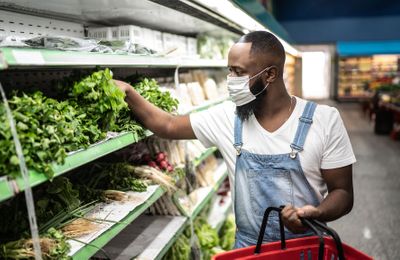By clicking a retailer link you consent to third-party cookies that track your onward journey. This enables W? to receive an affiliate commission if you make a purchase, which supports our mission to be the UK's consumer champion.
Takeaways, shopping and supermarket deliveries - can you catch coronavirus from them?

Many supermarkets are asking customers not to touch items that they aren't going to buy, and many retailers' reopening plans include quarantining items that people touch and then discard.
It's natural to feel concerned when food shopping, and ordering takeaways and supermarket deliveries in the current climate.
There's a lot of misinformation and speculation out there. So Which? has rounded up the advice from the Food Standards Agency (FSA) and UK government so you have the correct information you need to stay safe.
Which? coronavirus news and advice - see here for all the latest on the pandemic.
Can you catch COVID-19 from a takeaway?

You're very unlikely to catch COVID-19 from food. The FSA states that COVID-19 is a respiratory illness and 'not known to be transmitted by exposure to food or food packaging'.
Food businesses have been issued their own government guidance on food hygiene.This includes:
- Staff wearing clean, suitable clothing
- Food handlers who are unwell staying at home
- Frequent handwashing
- Frequent cleaning, and disinfecting of objects and surfaces that are touched regularly
Still, you should order your takeaway by telephone, app or online if you can, rather than collecting it in person, to avoid coming into contact with more people than you need to.
When your takeaway arrives, make sure you stay two metres away from the person delivering it.
If you do need to collect your meal yourself, agree a set time so you're not hanging around longer than necessary. Be sure to follow the social distancing rules set by the takeaway or restaurant, which could include staggered collection times and a queue management system to ensure people stay two metres apart from each other.
Find out more about food hygiene ratings generally and what the picture is like in your area of the country, by checking out our guide to the best and worst places to eat in the UK.
Best practice when receiving a supermarket delivery

The FSA says that there shouldn't be any need to sanitise the outer packaging of food, because food businesses are required to have a system for managing food safety in place, and that should include keeping packaging clean. It points to World Health Organization (WHO) advice that the likelihood of an infected person contaminating commercial goods is low.
The FSA said: 'The risk of catching the virus that causes COVID-19 from a package that has been moved, travelled and exposed to different conditions and temperature is also very low.'
So you don't need to remove the packaging of food you've bought from the supermarket. In some cases, it would be sensible to do so, if it means you can fit more into your fridge. But don't do it if it's likely to make the food deteriorate quicker - forcing you to do another food shop sooner.
As for the your groceries themselves, the FSA says that cooking food thoroughly should kill the virus.
When handling and eating food, you should follow good hygiene and preparation practices anyway. Wash your hands with soap and water for at least 20 seconds before and after preparing food. Wash fresh produce to help remove any contamination that may be on the surface. You can also reduce surface contamination by peeling the skins or outer layers off certain fruits and vegetables.
As usual, the FSA advice is not to wash raw chicken and other meat as it can result in cross-contamination in your kitchen.
- Get to know the latest food washing and packaging recommendations in our guide to the latest coronavirus need-to-know food and eating advice.
- To find out how you should handle other parcels and deliveries, see our guide to whether your deliveries, parcels and post are safe.
How to shop safely during the coronavirus pandemic

The FSA says that it's 'very unlikely' food and packaging being imported from affected countries abroad would be contaminated with coronavirus. It says: 'The law requires the exporter to follow the right controls during the packing and shipping process to ensure good hygiene is met.'
Nevertheless, it's considerate and responsible to only touch what you intend to buy in a shop, especially when selecting loose foods such as fruit, vegetables and bread in a bakery. Some supermarkets have already introduced 'no-touch' policies for goods and trolleys.
The FSA hasn't banned the use of reusable cups and containers when buying drinks at cafes - it's at the discretion of the individual business.
If you are using a reusable cup, the FSA advises these be fully cleaned in hot, soapy water or washed in a dishwasher, if the cup is dishwasher-safe.
Expect queue control, perspex screens at the tills and signs or floor markings requiring you walk one way around the supermarket or shop for some time to come.



